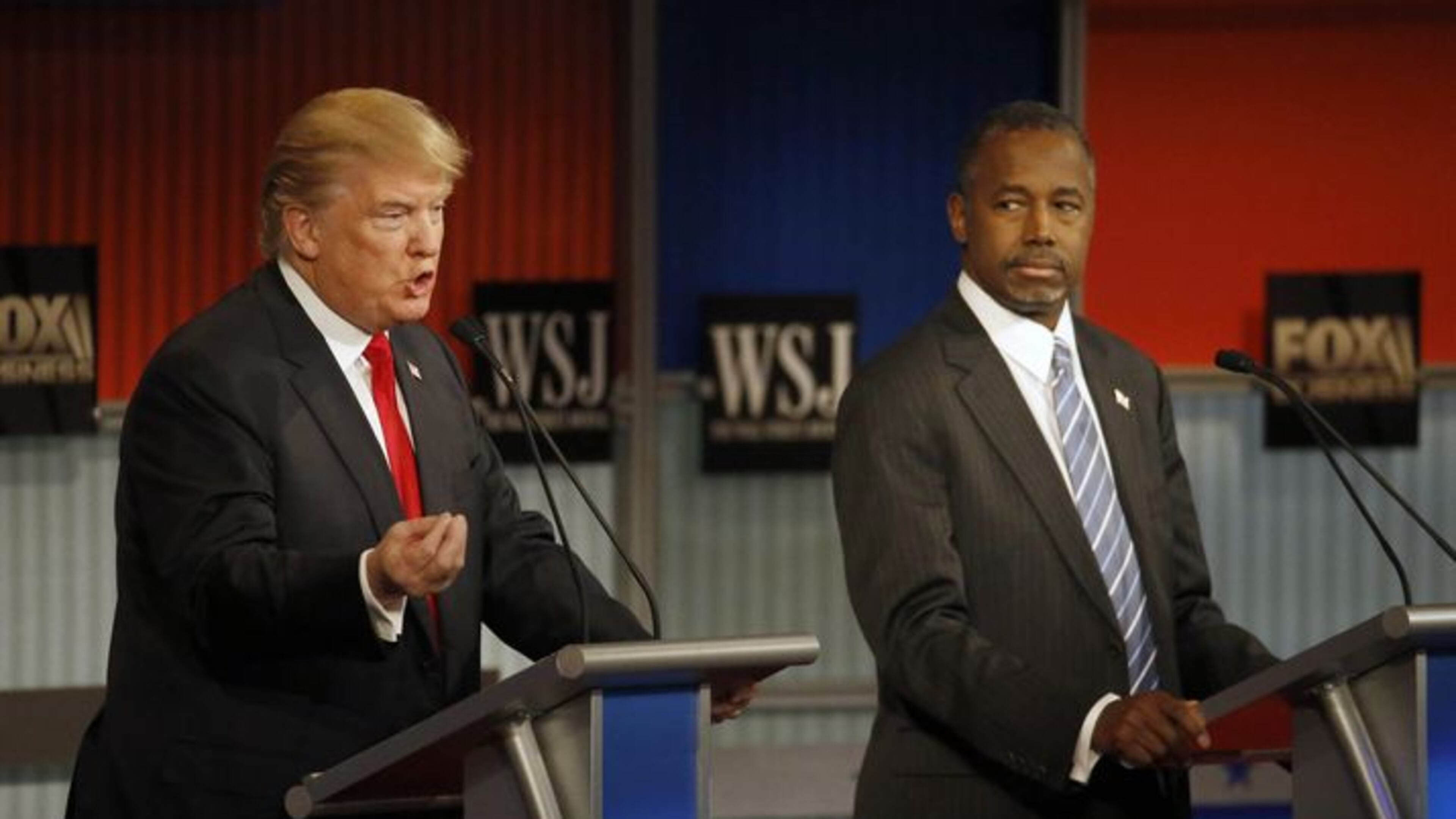Smaller group on stage makes for a more substantive GOP debate

The one certain truth about last night's debate is that no one wished two or three more people had been on stage. Maybe folks wished Candidate X had been on the stage instead of Candidate Y, but I can't imagine anyone thinks it was better having 10 or 11 debaters than having eight. Five or six would've been an ever better number. Still, there was more substantive debate on more issues such as taxes, foreign policy, immigration and the economy that drew out the real differences among the candidates. (This was also in part because the moderators did a better job of asking questions designed to elicit real answers rather than drive-by attacks.)
Oddly, though, this different approach to the debate strikes me as unlikely to spur a big shift in the horse race. I would be surprised if many people changed their minds if -- and this may be a big "if" -- they have watched each of the debates.
Donald Trump continues to look smaller and smaller on stage with each passing debate, his shtick long since overplayed. He was booed a couple of times -- most notably for criticizing Carly Fiorina for interrupting someone else. Not coincidentally, his shot at her came shortly after she had landed a hard, direct blow on him (about having a "private meeting" with Vladimir Putin, rather than a chance encounter "in a green room for a show" as Trump had just described his own experience with the Russian leader). It is painfully obvious that he almost always stays out of the meatiest exchanges. When he did engage on the recently unveiled Trans-Pacific Partnership trade deal, he blustered once again that China was winning ... until Rand Paul pointed out China isn't a party to the deal and would benefit far more if the deal fell apart. I expect his slow fade to continue.
The other leader in the polls, Ben Carson, continues to float through these debates at 30,000 feet. After floundering around a bit on issues such as the minimum wage, he seems to have mastered the standard Republican talking points on them. But wasn't part of his appeal before his refusal to simply speak in that standard political lexicon? To be another standard politician? I sound like a broken record on this, but I have never understood his appeal as a presidential candidate, I don't understand it now, and I can't see how he will remain at the top of the polls. I expect I'll be right about that last part one day, though Carson probably fared well enough to avoid an immediate slide.
For the second straight debate, I thought Marco Rubio and Ted Cruz did exactly what they needed to do. Rubio has a knack for taking a a direct but uncomfortable question and responding with a big-picture, principled answer that keeps him on message. At the same time, when he chooses to do so, he can speak with plenty of detail -- such as when he followed a couple of bumbling responses by Carson and Jeb Bush about bank bailouts with a dissection of why big banks get their way in Washington and why the Democratic response to the financial meltdown, Dodd-Frank, makes matters worse. In the way he moves between those modes of speaking, he is reminiscent of the Barack Obama of 2007-08. That may not make him very popular with all Republicans, just the ones who want to win.
Cruz laid down a couple of markers for ways in which he may tangle with Rubio in the future, including a dig about sugar subsidies (a Floridian equivalent of the ethanol mandate in Iowa). But he didn't go after Rubio by name. If you were looking for confirmation that at least one of those two campaigns thinks both are in it for the long haul, that may have been it.
John Kasich was his usual abrasive self, but more so. After last night, he is not only pro-Medicaid expansion but apparently pro-bailout as well. You can run against certain elements of your party's dogma, but you can't run against all of them. He might make a fine Treasury secretary, maybe even a running mate. But I can't imagine he's a serious contender for the top of the ticket anymore.
The presidency of George W. Bush gets brought up mainly for two things: the Iraq war and the financial crisis/bailouts. Jeb Bush now has managed to sound less than prepared, and certainly less than convincing, about both topics. He tried to be more assertive early on, surely mindful that he got little air time in the previous debate, but was overrun twice by Kasich. A good man, that Jeb. A smart man. And a lousy candidate.
Rand Paul gave his best effort yet in this campaign at sounding like the atypical Republican he has always been branded, criticizing his rivals for their tax and foreign policies. But I'm not sure there are enough votes out there in the Republican primary for someone so far outside the GOP mainstream on such central issues.
Carly Fiorina had another strong performance after a comparatively weak one the last time out. She continues to hone in on the Democrats' presumptive nominee, Hillary Clinton. Though she frames that as a reason to put her atop the ticket, it almost makes her seem like she's overtly auditioning to be No. 2, given the running mate's traditional role as the one who attacks the other party's presidential nominee. And she would be very, very good at that.
